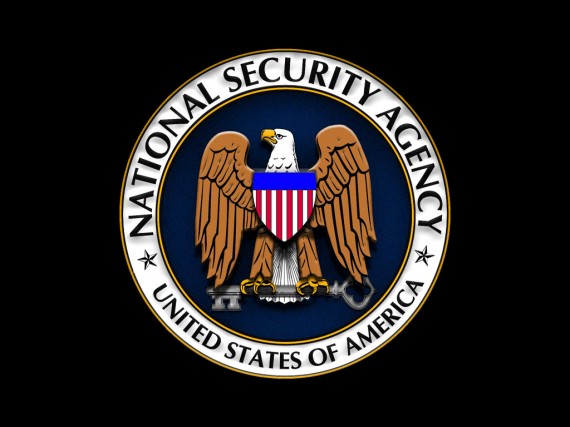NSA Data Mining: It Doesn’t Matter If It’s Legal
Just because NSA data mining is legal, that doesn't mean it's proper or that the American people should tolerate it.
One of the recurring comments I’m hearing from defenders of the NSA data mining operations that have been unveiled over the past several days, both from politicians on Capitol Hill and pundits out in the field, is that there was nothing illegal about what was done in any of these cases. Based on on a preliminary review, it would appear that they are correct in this assertion. Indeed, the powers granted to law enforcement and intelligence agencies by the PATRIOT Act and other laws are so broad that it’s hard to wonder what form of surveillance wouldn’t be permitted under current law, assuming we ever found out about it of course. Legality, however, is really only half of the equation here. There are many bad laws out there that allow the government to do things that they probably shouldn’t, and and some “good” laws that go to far in the kind of authority they give to the government. More importantly, though, as J.D. Tuccille argues at reason, it really doesn’t matter if the NSA data mining program is legal:
Perhaps the most overused word in the English language, at least when it comes to government officials justifying their actions, is “legal.” The word merely means that government officials jumped through the nominally appropriate rituals required to authorize themselves to do something. Itdoesn’t mean the something they authorized themselves to do is respectful of the rights of others, morally upstanding, or wise. Pass a constitutional amendment (or just repeal a few laws in many countries) and you could even make rape and murder “legal.” But they’d still be offenses against human rights and simple decency.
At the end of the day, when it comes to government snooping on the phone records and Internet activity of millions of Americans, it doesn’t matter in the least if it’s legal or if procedures were followed. What matters is that the privacy of millions of people has been violated without probable cause or suspicion of wrongdoing, simply so the government could scoop up data on the off chance of finding something interesting. Rogers and Feinstein assure us that broad snooping, without cause, “thwarted” a domestic terror plot. OK. And kicking in the doors of every American citizen would, no doubt, uncover criminal activity. That’s not good enough.
Free people don’t tolerate government officials who think “legal” trumps “right.” We can do a hell of a lot better than the likes of Feinstein, Rogers and Holder assuring us that they did good because they gave themselves permission to do evil.
While I haven’t researched the issue myself, it seems pretty clear that what the NSA is doing here is fully authorized under the law. Until the Courts say otherwise, and so far they have not, the PATRIOT Act and the other laws passed in the wake of 9/11 are the law of the land, and it’s naive of anyone to think that any President would pass up the opportunity to use these powers as part of the so-called “war on terror.” Indeed, just imagine if President Obama had scaled back this kind of project or some of the other Bush-era anti-terror policies. Had their been an attack, say one in Boston on the day of the Boston Marathon, the immediate criticism would have been that those changes were responsible for the first terror attack on American soil since September 11,2001. Of course, since President Obama didn’t scale back those programs and that attack in Boston happened anyway, we arguably have a perfect counterfactual. All of this surveillance, even enhanced by some vague warnings from Russian authorities, weren’t sufficient to stop Tamerlan and Dzhokhar Tsarnaev from pulling off an attack that killed three people, injured hundreds, and led to a standoff that brought a major American city grinding to a halt on a certain Friday in April. Of course, rather than being an argument for the ineffectiveness of the current anti-terror surveillance regime, the events in Boston have become an argument for enhancing those programs.
The fact that the programs are legal, however, doesn’t mean that they are correct. The are plenty of things that are legal that are improper, and, to a large degree, these data mining programs strike me as being highly improper. Gathering large amounts of data indiscriminately and making every effort to keep it secret aren’t things that the government of a free people ought to be doing even if it does have the authority to do it. The law aside, programs like this violate at the very least the spirit of the Fourth Amendment and continue the process of turning American citizens into subject of the government rather than the government being subject to the will of its citizens. That ought to disturb everyone regardless of political party.
The blithe manner in which Senators like Diane Feinstein and Lindsey Graham, and Congressmen like Mike Rogers, have dismissed the rather obvious civil liberties and privacy concerns that these program raises should be something that offends every American. Here we have a massive operation in which the NSA is gathering all kinds of data indiscriminately and doing who knows what with it. The idea that we should simply sit back, accept it, and trust our government to do the right thing with these vast powers is, quite simply absurd. It’s time to start asking questions about how this data is collected, what is done with it, and what, if any, permanent records are being created based upon it. It simply isn’t enough for them, or President Obama, to say “Trust us” and expect everything to be okay. The bonds of that trust have, rightfully, been shattered and, if the American people are still awake at this point, they’ll stop taking the word of their representatives and actually start demanding some answers about what’s being done in their name.






Amen. Obama promised to protect civil liberties and to be the most transparent administration ever. On those points, he’s failing miserably. He’s protecting civil liberties and being only as transparent as current law requires him to be.
Make sure you lock that barn door after you close it.
Horses? What horses?
Seriously, though, I’m starting to think the lack of outrage we’re seeing isn’t due to somnolence or complacency, but rather a sign of approval. Most Americans want the “dots” to be “connected” and they don’t worry about how, because they know they’re not a “dot.”
Yeah, I’m sure they would be defending the Jim Crow laws because they were ‘legal.’ We have no moral standing left to tell the rest of the world to do the right thing.
“Free people don’t tolerate government officials who think “legal” trumps “right.””
People who put their personal view of what is “right” above the views held by the remainder of the society do not deserve to be a tolerated as part of the society, because it is not the governmental officials who are “evil” in that circumstance, it is the society as a whole. If they are unable to accept that, at the end of the day their views were not accepted, and content themselves with living under the views the remainder of the society holds while trying to change them through persuasion, then they should find a society amenable to their peculiar views.
@Mikey:
The lack of outrage comes from the lack of practical harm done. I’m discussing this on other threads and don’t want to repeat myself too much, but basically, so what? So the NSA has my credit card receipts and listened to my Skype call the other day and knows my porn preferences. So? Does that take a dollar out of my pocket? Does it harm my children’s health? Is my rent going up? Will traffic on the 101 be worse? Will it affect the weather? Will jack-booted thugs come and kick in my door because I had the chicken at lunch yesterday? Is there a drone targeting me for the crime of ego-Googling?
@Moosebreath:
This sounds remarkably like, “If you don’t love America, you can get out.”
A lot of horrible things done by our government were legal, highly popular, and either directly enshrined in the Constitution or approved by the Supreme Court. Slavery. Jim Crow. Japanese internment. Criminalization of same-sex relations.
I don’t think this is in that category, but then I’m not absolutely sure what *this* is given the nature of covert intelligence operations. As noted this morning, I think what they do to us at the airports–which most people hate and seems obviously to violate the 4th Amendment—is likely far worse. But, it, too, is legal.
Bear in mind that George Washington and Thomas Jefferson had far less privacy than we do today. They had slaves watching everything they did. They were rich men, but the poorer folks would have had even less privacy down in the villages and settlements. Everyone knew everyone’s business.
Our current definition of privacy is quite unusual historically speaking. It’s a short-term phenomenon born of wealth: we can afford single family homes and don’t have to walk into the back yard to take a dump while being watched by the neighbors.
@michael reynolds:
I think that’s right. People do a cost/benefit analysis, see essentially no cost, and if they accept the government’s assertions of prevented attacks they perceive a benefit. So they go “meh” and continue with their day.
Also, as has been pointed out (by you, I believe), Google knows all this stuff already. The government gets it from them.
Is that even possible?
There’s a big difference between an attack that kills three people and an attack that kills 3,000, n’est-ce pas?. Most people would be happy with a system that allowed the former and prevented the latter.
Great. So we should close down these programs and do what instead, exactly. According to Senator Feinstein ( Not a fan of her, but still) data mining did foil other plots. If this is true, does that change the calculus? What about the (massive) data mining by big corporations? Should we ban that too?
I agree with you, but after a decade now, its clear that the public is OK with this. Hell, this data mining has been going on since the 2006 and the Republic still stands. Civil libertarians are lighting up Twitter about this, but the general public will likely just shrug this off. As one poster said, I don’t see folks in tri- cornered hats marching around raising hell about this( Maybe if it had to do with lowering taxes on rich people, we would see more action).
@michael reynolds:
We don´t know. As far as I know you don´t have relatives in Afghanistan, Yemen or in Pakistan. It´s entirely possible that people are being harassed by the authorities because they are making perfectly legit calls to these countries, for instance.
I am reminded of Doug’s posts on the economy and unemployment.
He wants to shrink Government…but when that causes a sluggish economy he is all gloom and doom…without ever acknowledging that it is exactly what he has been asking for all along.
Apply the same lack of ideological accountibility here and follow it to it’s logical conclusion.
So maybe we stop the NSA from doing what they are doing. And maybe it doesn’t stop a significant case of terrorism…as Mike Rogers has said this did.
Will Doug then finally admit his Libertarian wet-dreams are destructive and not productive?
Or will he continue to refuse accountibility for his foolish political theories?
@James Joyner:
This is a problem. Some more disclosure might be a good thing , but frankly, it will never be enough for the folks who would rather the government not do this at all.
I think a little bit more discussion as what plots are foiled, and how this surveillance foiled those plots might be good. Unfortunately, that might mean that those methods of foiling the plots might be “burned” in the future.
Again, I don’t think the general public is demanding any further disclosure, or particularly cares about this.
@Ben Wolf:
“This sounds remarkably like, “If you don’t love America, you can get out.””
I’d say it’s more like “If you think America is evil, and you are a minority of one, you can get out.” There’s a huge difference between disagreeing with the government’s policies and thinking that they are “evil”. There’s also a huge difference between a position held by a significant number, but not a majority, and a position held by a vanishingly small number of people who are indistinguishable from a rounding error.
Imaginary dialogue with Xi Jinping:
I’d like to lay these privacy problems at the feet of my fellow Americans, who are a bunch of bed-wetters afraid of their own shadows and other things with dark skin. If we, as a nation, would man up about terrorism, then we wouldn’t need to data mine to keep us “safe.”
@michael reynolds:
This strikes me as a pretty anacronistic understanding of privacy, caught up in looking at in terms of performance versus as a power.
While I understand your point, a key aspect of “privacy” is control over one’s own information. So even though slaves might have been watching them/gathering information, those slaves had absolutely no way to capitalize on that information. So in that respect, Washington and Jefferson enjoyed a significant amount of privacy.
And when they wanted privacy, they could get it — banish the slaves from a room.
However, flip the roles — Washington and Jefferson could control every aspect of their slave’s external lives. They could force themselves into their lodgings (an in Jefferson’s case bodies). And the slaves couldn’t say “no.” At best, they were protected by some social norms.
So it seems to me, that for all intents and purposes, the Rich/Elite have always had access to a higher degree of privacy than anyone else. And the lower you get on the totem pole, the easier your privacy can be violated and your information (if not your entire body) commodified.
@Mikey:
I think you are right on this. As I said elsewhere, because of Hollywood, a lot of Americans think the government is already listening to our phone calls and reading our emails, and they don’t have a problem with it, because they have nothing to hide.
For irony, this is going to be a target rich environment. I suspect we’re going to see a lot of people who are absolutist about the Second Amendment being a lot squishier about the Fourth. And vice versa.
@Matt Bernius:
If you know the “massa” dresses up in girl’s underwear I imagine ways can be found to leverage that.
In some ways the higher up the pole you are the more you have to fear from exposure. It’s a long way down when you’re rich and famous and the cops catch you getting a BJ from a tranny on Hollywood Boulevard.
@stonetools:
Don’t kid yourself. No one on the right cared when the Bush administration not only recorded actual communications but did so illegally with no warrant, not even a FISA warrant (which the right now says is easier to get than syphilis in a Turkish bordello… Hilarious!).
@michael reynolds:
Maybe. But I tend to suspect that your built in ability to imagine a good story might be getting ahead of your ability to look at the actual history.
But then again, this isn’t my particular area of expertise, and I might be getting caught up in my own biases.
@michael reynolds:
And the “massa” can have you killed, because you are property.
You’re right that the rich/elite have more to fear from exposure, but that doesn’t make the analogy with slaveowners work.
@Moosebreath:
Sure. Just like the vanishingly small number of people who were advocating for marriage equality before the last 15 years.
@michael reynolds:
Not if he can have you whipped to death with absolutely no consequence, no, there isn’t.
I used to get a lot of “Wake up, America!” e-mails forwarded to my inbox. Stopped getting them after replying-all to a few of the more egregious ones.
I guess they were surprised to find me not only conscious, but skeptical.
I recall learning some time after the Iraq war began that the government had launched large scale data mining operations in 2001 or so. Now, sure, the programs are undoubtedly more sophisticated now than they were then, but … Doug’s just getting outraged now?
99.9% of the time when Doug posts on an issue, he takes the legal side and runs with it, accusing others of emotional, non-legal reasoning. And he chooses THIS to ditch the legal arguments and argue for right/wrong?? BWAHAHAHA!! What rock were you hiding under from 2001-2009, Doug??
Sigh. You guys understand that I do get the dynamics of slavery, right? And that I was just playing?
Aren’t searches at airports conducted without probably cause or suspicion of wrongdoing? Is the use of bomb sniffing dogs also “wrong?”
@Spartacus: Yup and I’m not surprised.
Actually this whole bit doesn’t surprise me at all. I’m actually surprised it’s not worse.
Major companies data mine all the time. The amount of information google and facebook has on you would horrify you.
@matt: It is worse, we just don’t know about the rest.
@Spartacus: i hate for this important debate to be directed at a single president. People loose all credibility if they are going to point to one president past or present, or one party. If we really understand the dangers this program presents to freedom all sides of the isle need to come together.
It certainly doesn’t matter if it’s (NSA Data Mining) legal from the standpoint of those who want to impeach Obama – any combination of “scandal” including Benghazi, NSA Data Mining, and IRS investigations into the validity of tax exempt status claimed by partisan political organizations will do.
I say, support the Electronic Frontier Foundation’s efforts to attempt to establish privacy boundaries. I gave to EFF at home, I support their mission, as difficult as it is.
@michael reynolds:
Only through Petaluma in the morning, and from Novato to Petaluma in the evening.
There … you’re welcome.
6/18/2013 House Intelligence Committee:
General Alexander specifically states that NSA does not datamine or pattern search the phone records.